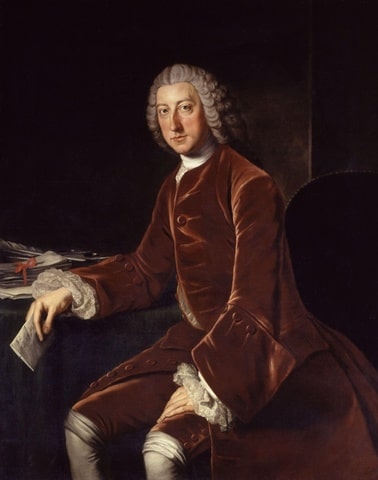Contents

Contents
No one knew whether William Pitt would speak for or against the Stamp Act in the House of Parliament. In fact when he finally spoke he did not support the ministry, nor the architect of the Act, his brother-in-law George Grenville, but the Americans [who] are the sons, not the bastards of England.
When he finished speaking, Grenville rose to speak in support of the Stamp Act and to ridicule Pitt’s defense of the colonies. Since Pitt had already spoken, he should not have been able to speak again. But he rose to say I do not speak twice. I only finish and then continued extemporaneously with the greatest speech of his career, excerpted here.
The gentleman tells us, America is obstinate; America is almost in open rebellion. I rejoice that America has resisted. Three million of people so dead to all feelings of liberty, as voluntarily to submit to be slaves, would have been fit instruments to make slaves of the rest. I come not here armed at all points, with law cases and acts of parliament, with the statute book doubled down in dog’s-ears, to defend the cause of liberty: if I had… I would have have shown that even under former arbitrary reigns, parliaments were ashamed of taxing a people without their consent, and allowed them representatives.
I am no courtier of America; I stand up for this kingdom. I maintain, that the parliament has a right to bind, to restrain America. Our legaislative power over the colonies is sovereign and supreme. When it ceases to be sovereign and supreme, I would advise every gentleman to sell his lands, if he can, and embark for that country. When two countries are connected together, like England and her colonies, without being incorporated, the one must necessarily govern; the greater must rule the less; but so rule it, as not to contradict the fundamental principles that are common to both. If the gentleman does not understand the difference between external and internal taxes, I cannot help it; but there is a plain distinction between taxes levied for the purpose of raising a revenue, and duties imposed for the regulation of trade, for the accommodation of the subject; although, in the consequences, some revenue might incidentally arise from the latter.
The gentleman asks, when were the colonies emancipated? But I desire to know, when were they made slaves. But I dwell not upon words. When I had the honour of serving his Majesty, I availed myself of the means of information which I derived from my office: I speak, therefore, from knowledge. My materials were good; I was at pains to collect, to digest, to consider them; and I will be bold to affirm, that the profits to Great Britain from the trade of the colonies, through all its branches, is two millions a year. This is the fund that carried you triumphantly through the last war. The estates that were rented at two thousand pounds a year, threescore years ago, are at three thousand pounds at present. Those estates sold then from fifteen to eighteen years’ purchase; the same may now be sold for thirty. You owe this to America: this is the price America pays you for her protection. And shall a miserable financier come with a boast, that he can bring a pepper-corn into the exchequer, to the loss of millions to the nation? …
A great deal has been said without doors of the power, of the strength of America. It is a topic that ought to be cautiously meddled with. In a good cause, on a sound bottom, the force of this country can crush America to atoms. I know the valour of your troops. I know the skill of your officers. There is not a company of foot that has served in America out of which you may not pick a man of sufficient knowledge and experience to make him governor of a colony there. But on this ground, on the Stamp Act, when so many here will think a crying injustice, I am one who will lift up my hands against it.
In such a cause, your success would be hazardous. America, if she fell, would fall like a strong man. She would embrace the pillars of the state, and pull down the constitution along with her. Is this your boasted peace? Not to sheathe the sword in it scabbard, but to sheathe it in the bowels of your countrymen? Will you quarrel with yourselves, now the whole House of Bourbon is united against you…
The Americans have not acted in all things with prudence and temper. They have been wronged. They have been driven to madness by injustice. Will you punish them for the madness you have occasioned? Rather let prudence and temper come first from this side. I will undertake for America, that she will follow the example. There are two lines in a ballad of Prior’s, of a man’s behaviour to his wife, so applicable to you and your colonies, that I cannot help repeating them:
Be to her faults a little blind Be to her virtues very kind.
Upon the whole, I will beg leave to tell the House what is really my opinion. It is, that the Stamp Act be repealed absolutely, totally, and immediately; that the reason for the repeal should be assigned, because it was founded on an erroneous principle. At the same time, let the sovereign authority of this country over the colonies be asserted in as strong terms as can be devised, and be made to extend every point of legislation whatsoever: that we may bind their trade, confine their manufactures, and exercise every power whatsoever — except that of taking money out of their pockets without their consent.


